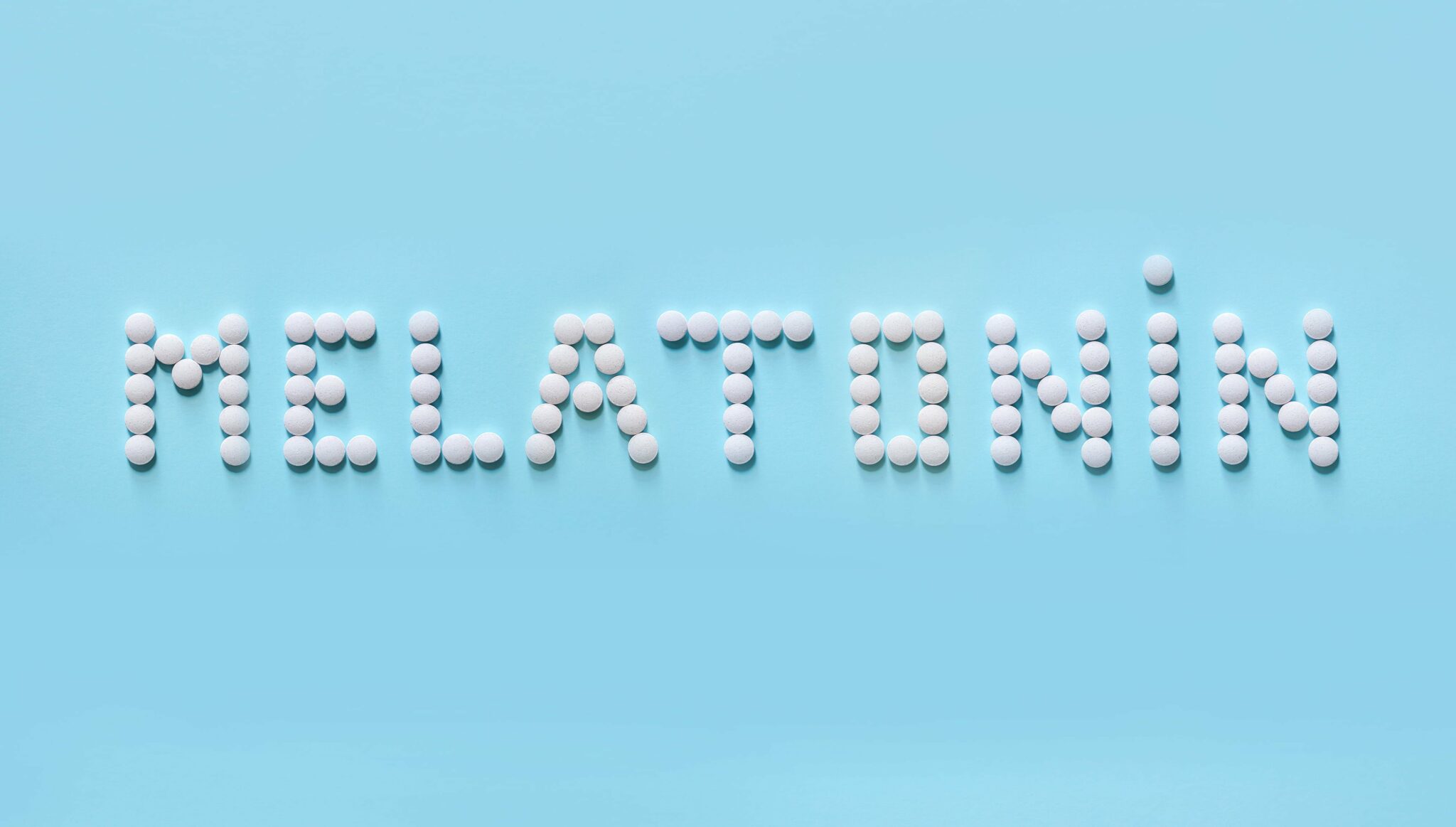If you’ve ever struggled to sleep (which, who hasn’t?), you’ll likely agree that you’d do anything to get a better night’s rest the next night. And that might mean taking a sleeping pill. Among all of the sleep aids on the market, melatonin is one of the most common options. Most people have heard of taking melatonin to improve their sleep at night, but does it really work, and if so, how?
Melatonin has a lot to do with your body’s natural circadian rhythm, or, your body’s alignment with the natural light and dark that come with the 24-hour cycle of a day. When a person’s circadian rhythm is out of sorts, they can take a melatonin supplement to combat their resistance to the natural sleep-wake cycle. But what exactly does melatonin have to do with sleep?
What is melatonin?
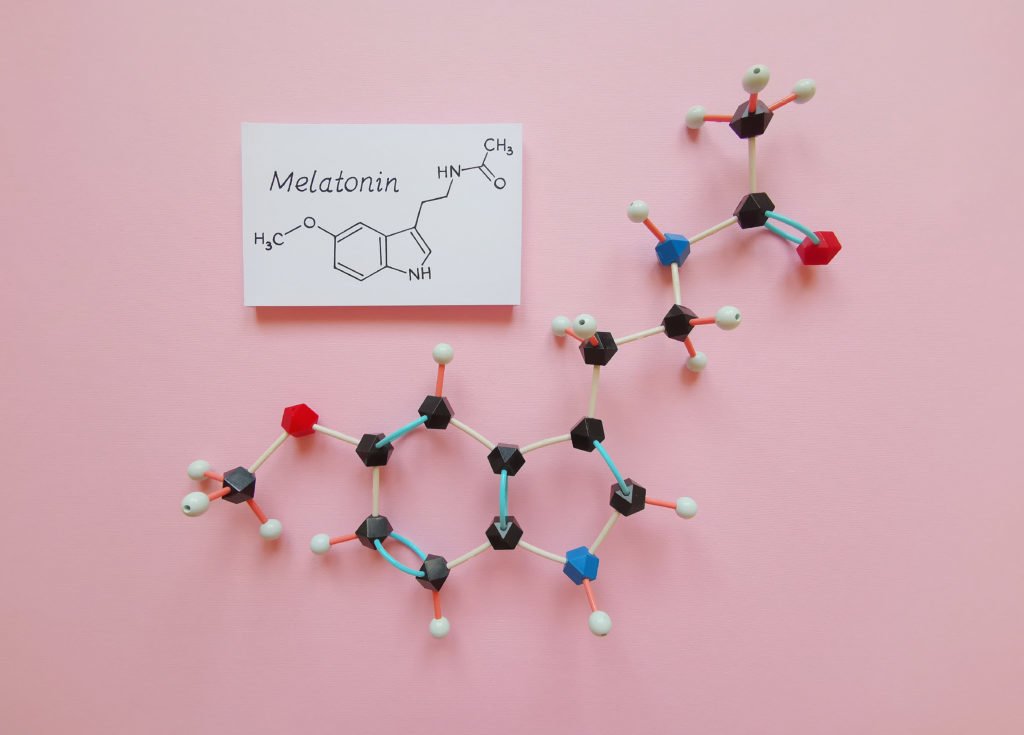
Melatonin is a natural hormone your body produces and is heavily involved in regulating and controlling your circadian rhythm.
The pineal gland, the tiny structure in your brain responsible for producing melatonin, works on a schedule based on light and darkness. During the day, the pineal gland is inactive. At night, however, with the absence of any natural outdoor or artificial indoor lighting, it becomes active and starts to produce melatonin, which naturally puts your body in a sleepy state.
Melatonin can also come in supplemental form and is often used to improve sleep quality. People who struggle with sleep disorders, experience jet lag or have abnormal sleep schedules sometimes take supplemental melatonin to attain restorative rest.
Does melatonin work as a sleep aid?
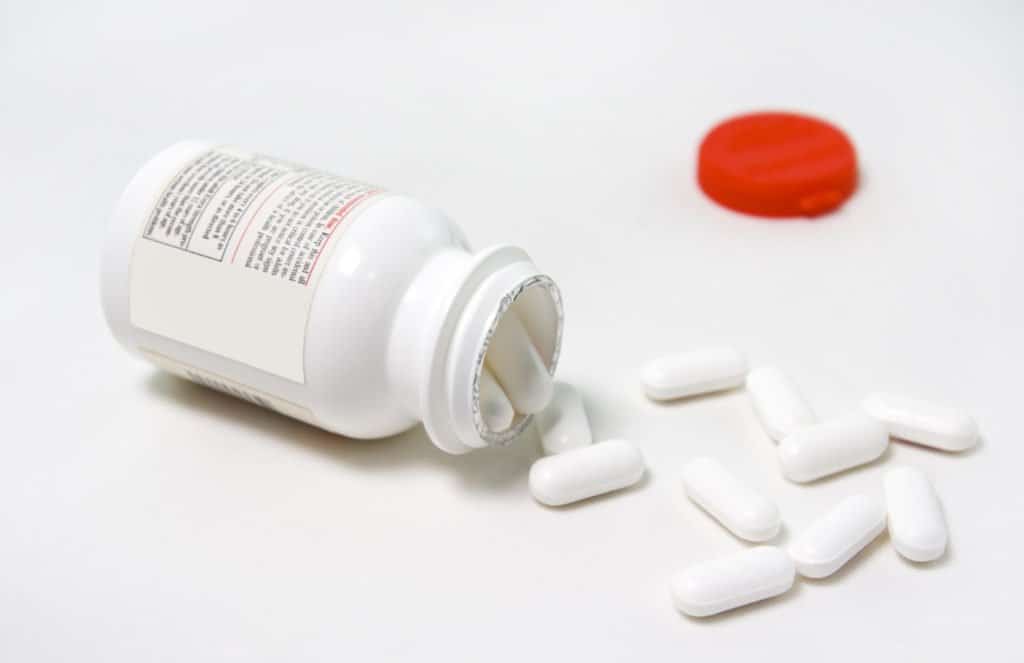
Measurable effectiveness in treating sleep problems with melatonin is still very limited. There are some studies, however, that demonstrate the benefits melatonin can provide for people with specific sleep disorders.
In a 40-participant 4-week study in Poland, researchers tested the effects of a mix of melatonin, vitamin B6 and medicinal plants on people who had mild to moderate sleep disorders. The results demonstrated “significant improvement” in sleep quality among the participants and stated mild to moderate insomnia could benefit from the combination of elements their participants tried. 1
Delayed Sleep-Wake Phase Disorder
Delayed Sleep-Wake Phase Disorder (DSWPD), a Circadian Rhythm Sleep-Wake Disorder (CRSD) characterized by the innate inability to fall asleep at a considerably healthy time, is another sleep disorder commonly associated with the use of melatonin for improved sleep, specifically if intake is timed.
People with DSWPD typically go to bed at very late-night or early-morning hours, and therefore, wake up late the next day. DSWPD makes it difficult to create a normalized sleep schedule that would align with typical morning responsibilities, like work or school. That’s where melatonin can step in as a tool to help people with DSWPD sleep on a better schedule.
Treatment for DSWPD is multifaceted, though. When it comes to dosage of melatonin, it’s recommended to time a 0.5mg dose 10 to 12 hours before the average “midpoint” of sleep on free days, or, the days when a person with DSWPD catches up on sleep. The melatonin would work as a “time cue” rather than something that would lull the person to sleep. Along with timing small melatonin doses, a person with DSWPD should also be aware of their exposure to both natural and artificial light. This means limiting interactions with indoor lighting after sunset and spending time outdoors upon waking up in the morning. 2
Shift Work Disorder
Another group that may benefit from a melatonin supplement is people with Shift Work Disorder (SWD). People who work in shifts, specifically at night or outside of the typical work day hours can suffer from a fragmented circadian rhythm. Yet again, melatonin would serve as a tool to essentially realign their circadian rhythm.
How much melatonin should I take to sleep?
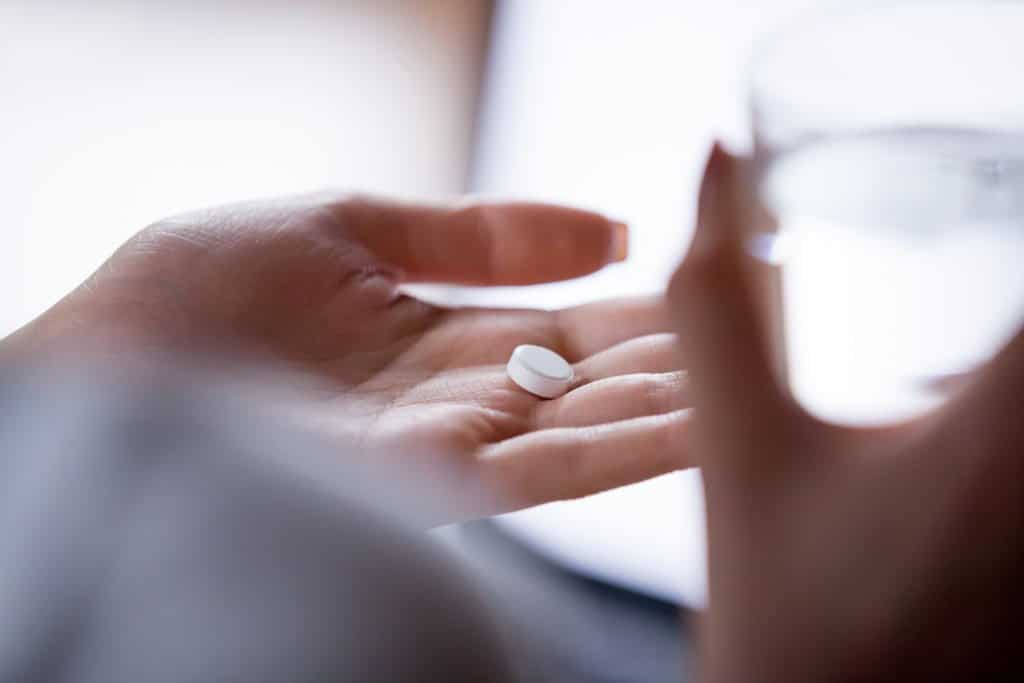
Supplemental melatonin does not require a prescription in the United States, but if you’re going to use it for sleeping purposes, it’s important to take the right amount at the right time. But, is melatonin safe? For short-term use, it is. 3 And, you can easily find melatonin at most grocery stores or pharmacies.
When it comes to dosage, there are mixed opinions, so talking to your doctor first is recommended. Melatonin bottles will provide recommended dosages, but the National Sleep Foundation states that a typical melatonin dose consists of 1 to 3 milligrams. 4 Usually it’s best to start with the lowest dose of 0.5mg and increase as needed.
Ultimately, the best dosage will depend on your age, your weight and your specific sleep problem or disorder. To best align with your body’s natural circadian rhythm, you should take melatonin close to bedtime.
Does melatonin have side effects?
Just like with any supplement or medication, taking melatonin as a supplement can have side effects. 5 Some of them include:
- Headache
- Nausea
- Drowsiness/ sleepiness
- Dizziness
It can be helpful to know potential side effects ahead of time, but it’s best to consult with your doctor before taking melatonin. They will also be able to determine the root cause of why you can’t sleep and treat it properly.
Who shouldn’t take it?

Before you decide to take melatonin to help you sleep better, consult with your doctor. Your doctor will be able to give you the best dosage if they determine it will benefit your sleep. Be aware that taking supplemental melatonin can adversely interact with certain medications, so be sure to ask your doctor if any medications you take will interfere with melatonin intake.
Research regarding long-term effects of using melatonin is debatable, but you should still use caution if you’re thinking about relying on it for better sleep. If you’re on the edge about whether or not you should try melatonin, consider the following factors, as there are more risks to using the supplement if:
- you are pregnant or breastfeeding.
- it’s for children.
- you have dementia.
- you use other supplements or take medication(s). 6
Potential drug interactions with melatonin include blood-pressure medications, diabetes medications, certain SSRIs and seizure medications. 7
The Future of Melatonin Usage
If you’ve ever used melatonin as a sleep supplement, or even just thought about trying it, you’ve probably also wondered if it’s the best sleep aid out there. When determining the benefits of something as serious as a supplement for sleep, it’s essential to look to the future.
A 2018 study out of the University of Missouri-Columbia School of Medicine found that targeting a specific melatonin receptor, MT1, can increase sleep while reducing side effects. The person behind the study, Mahesh Thakkar, PhD, professor and director of research at MU School of Medicine’s Department of Neurology, used a mouse to conduct research for the study. 8 Thakkar’s findings could indeed change how — and how much — melatonin treats sleep disorders in the future.
Melatonin is being added to new forms of delivery systems, including melatonin chocolate.
Takeaways
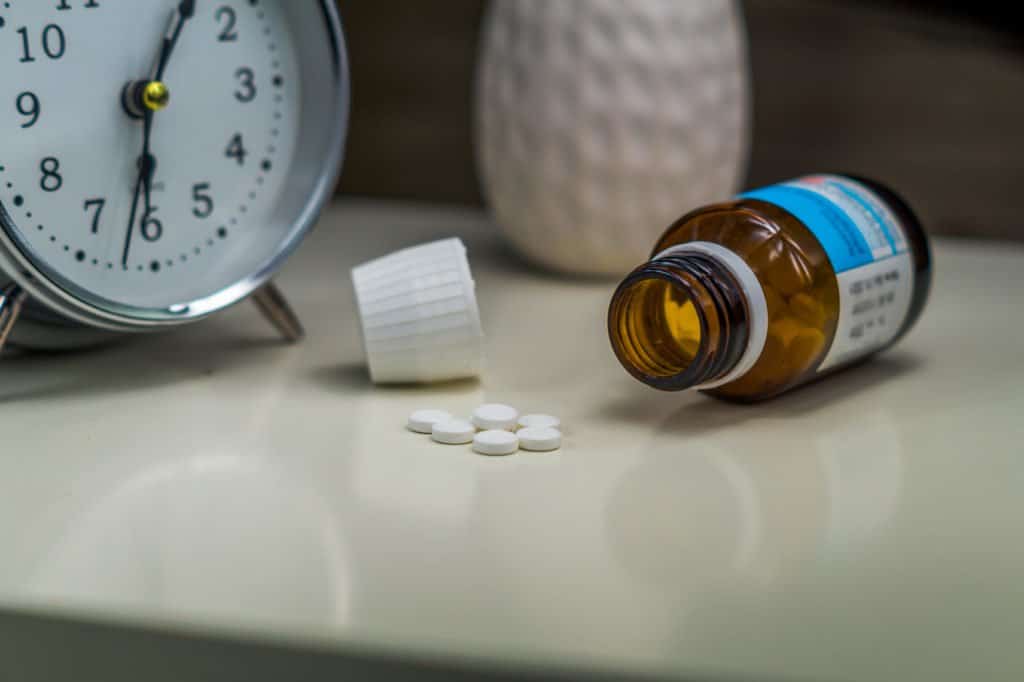
Still wondering if you should give melatonin a try? First, take a serious look at why you can’t sleep. Think about if it could be related to your daily routine, like caffeine intake, or if it could be a chronic issue that requires a medical diagnosis. Ask yourself how long your sleep problems have been occurring to see whether or not the problem constitutes a visit to the doctor.
What to remember:
- Studies about the effectiveness and correct dosage of melatonin for sleep are still limited. If you plan to take supplemental melatonin, use it only short-term and in small doses.
- Be aware that certain medications and medical conditions have the potential to negatively interact with supplemental melatonin.
- Most importantly, talk to your doctor before deciding to use supplemental melatonin. Discuss whether or not you could have a sleep disorder.
Terms
- Circadian rhythm: the 24-hour sleep-wake cycle innate to living organisms; also referred to as the sleep-wake cycle.
- Melatonin: A natural hormone produced in the body’s pineal gland that regulates your sleep-wake cycle; a common supplement used to treat sleep disorders or problems.
- Insomnia: A sleep disorder characterized by the difficulty of falling or staying asleep; chronic sleeplessness.
- Delayed Sleep-Wake Phase Disorder (DSWPD): Otherwise known as DSP, a Circadian Rhythm Sleep-Wake Disorder (CRSWD) characterized by a delayed sleep pattern and the inability to go to bed at a time that correlates with typical day-to-day activities and responsibilities.
- Circadian Rhythm Sleep-Wake Disorder (CRSWD): A category of sleep disorders marked by the disconnection between your body’s circadian rhythm and the light-dark cycle, resulting in poor sleep.
- Shift Work Disorder (SWD): Otherwise known as Shift Work Sleep Disorder (SWSD), a Circadian Rhythm Sleep-Wake Disorder characterized by the disruption of the normal sleep cycle due to work hours outside of typical time frames.
References
[1] Lemoine, P., Bablon, J.-C., & Da Silva, C. (2019). A combination of melatonin, vitamin B6 and medicinal plants in the treatment of mild-to-moderate insomnia: A prospective pilot study. Complementary Therapies in Medicine, 45, 104–108. Retrieved from https://www.sciencedirect.com/science/article/abs/pii/S0965229919303711?via=ihub
[2] Nesbitt A. D. (2018). Delayed sleep-wake phase disorder. Journal of thoracic disease, 10(Suppl 1), S103–S111. Retrieved from https://www.ncbi.nlm.nih.gov/pmc/articles/PMC5803043/
[3, 7] Mayo Clinic Staff. 2018, March 30. Melatonin. Retrieved from https://www.mayoclinic.org/drugs-supplements-melatonin/art-20363071?p=1
[4] National Sleep Foundation. 2019. Melatonin and Sleep. Retrieved from https://www.sleepfoundation.org/articles/melatonin-and-sleep
[5,6] National Center for Complementary and Integrative Health. (2019). Melatonin: What You Need to Know. Retrieved from https://nccih.nih.gov/health/melatonin#hed6
[8] University of Missouri-Columbia. (2018, May 15). New findings explain how melatonin promotes sleep: Discovery may lead to new therapy for insomnia. ScienceDaily. Retrieved from https://www.sciencedaily.com/releases/2018/05/180515113751.htm
Disclaimers
This article is for reference purposes only. It is not to replace or complement the advice of a licensed professional, nor is it intended to diagnose, treat, cure, or prevent any disease or condition. Any and all health concerns you have should be directed at a doctor.
Further Reading
- Best CPAP Cleaner
- Dockatot Review
- BedJet Review
- Feather Pillows
- Deep Pocket Sheets
- Mattress Trial
- Best Pillows for Stomach Sleepers
- Nolah Mattress Review

